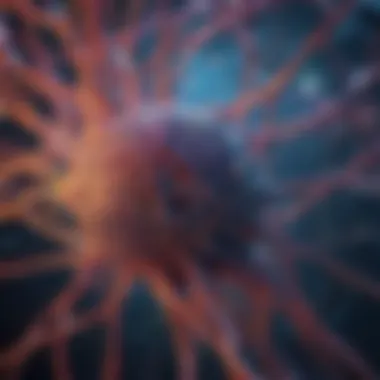Transformative Insights from 'How to Change Your Mind'


Intro
Michael Pollan’s audiobook, How to Change Your Mind, is a riveting exploration into the uncharted territories of human consciousness. It draws readers into the world of psychedelics, examining how substances like LSD, psilocybin, and others can pave pathways to personal growth and profound self-discovery. Understanding the thoughts and insights Pollan presents is akin to opening a new door in one’s mind that leads to reflections previously tucked away. As society gradually shifts its views on psychedelics, this narrative becomes increasingly relevant in our quest for mental well-being and deeper understanding.
This exploration provides much more than just anecdotes from Pollan’s own journeys; it lays bare the science behind these substances as well as the historical context that shaped their societal perceptions. By merging psychology with neuroscience, Pollan doesn’t just tell a story; he encourages listeners to rethink what they know about their minds and how they can change them. This article aims to underscore key themes from the audiobook while also considering its implications for today's world, especially regarding self-awareness and personal development.
Preface to 'How to Change Your Mind' Audiobook
In a world constantly evolving, where the search for deeper meaning has never been more prevalent, Michael Pollan’s audiobook How to Change Your Mind emerges as a beacon for those curious about consciousness, psychedelics, and personal growth. This introduction seeks to establish the groundwork for understanding the transformative themes that Pollan traverses in his exploration of psychedelics, offering listeners a lens through which they can examine their own perceptions and potentially alter their life trajectories.
Overview of the Author
Michael Pollan is not just a well-respected author; he’s a master at blending narrative with science, bringing complex subjects into the realm of everyday understanding. His previous works on food, gardening, and human health have won accolades and earned him a devoted readership. In this audiobook, Pollan dives into the world of psychedelics with the same finesse, uncovering historical usage, scientific advancements, and personal anecdotes that paint a fuller picture of how these substances may influence mental and emotional well-being.
Pollan approaches the subject not merely as an observer but as an active participant, candidly sharing his own experiences with various psychedelics. This personal touch resonates within the narrative, making the exploration of consciousness and perception not just academic but profoundly personal and relatable.
Purpose and Significance of the Audiobook
The purpose of How to Change Your Mind lies in its fundamental aim: to challenge the stigma surrounding psychedelics and enrich the discourse about their potential benefits. Pollan provides listeners with a structured framework that makes the complex interplay of psychology, neurology, and personal growth accessible.
The audiobook holds significance on multiple fronts:
- Educational: It informs listeners about the science behind psychedelics and their role in consciousness, paving the way for informed discussions on mental health and treatment options.
- Transformational: Pollan delves into the stories of individuals whose lives have been changed through psychedelic experiences, highlighting potential pathways for personal growth and healing.
- Cultural Commentary: It reflects on societal changes and the resurgence of interest in psychedelics, making it a timely resource for understanding current trends in mental health treatments.
In essence, this audiobook doesn’t merely provide knowledge; it invites listeners to consider the broader implications of how these substances can reshape our understanding of the mind and ourselves.
Themes of Consciousness and Perception
The exploration of consciousness and perception serves as the bedrock of understanding the transformative power that psychedelics hold within Michael Pollan's How to Change Your Mind. This section is crucial as it delves into the fundamental questions of what consciousness actually is and how our perceptions shape the reality we experience. By grappling with these themes, one can appreciate not only the philosophical implications but also the potential implications for mental health and personal growth.
Understanding Consciousness
Consciousness has puzzled scientists and philosophers for ages. It's like trying to catch smoke with your bare hands: elusive and slippery. At its essence, consciousness refers to the state of being aware of and able to think about one’s own existence, sensations, thoughts, and surroundings. Pollan discusses various perspectives on this complex topic, revealing its multifaceted nature. For instance, consciousness is often viewed through the lens of biology and neuroscience, which depict it as a product of brain activity. However, other approaches suggest that consciousness might be more than the sum of its neurological parts—hinting at a possible connection to broader existential or spiritual realms.
Pollan encourages listeners to consider the intricacies of their own consciousness. This is more than an academic exercise; it invites introspection and prompts a deeper understanding of oneself. Engaging with one’s consciousness can lead to profound insights about personal fears, desires, and even the societal structures that shape thoughts and behaviors. It also holds the potential to challenge preconceived ideas about the limits of human experience.
Role of Psychedelics in Altering Perception
Psychedelics come into sharp focus in this discussion of consciousness. They act as catalysts, significantly altering perception and providing windows into previously uncharted territories of the mind. When one ingests substances like psilocybin or LSD, the experience can seem like having one's frame of reference turned upside down. Colors become more vivid, sounds resonate differently, and thoughts can drift in unfathomable directions.
Such alterations in perception can cultivate a sense of interconnectedness—something many individuals report during their psychedelic experiences. This sense of unity can lead to profound personal revelations, allowing people to see their problems in a new light. For some, these experiences can dissolve barriers between self and environment, illuminating what it means to be part of something greater.
Pollan elucidates that these altered states can also serve as therapeutic tools, helping individuals confront deep-seated emotions or trauma. The anecdotal evidence is backed by emerging research suggesting that psychedelics can foster new neural pathways, potentially leading to transformative healing.
"The mind is a powerful maze. Psychedelics simply help you find the way out."
In wrapping up this section, it becomes clear that understanding consciousness, along with recognizing the role of psychedelics in altering perception, not only opens avenues for personal development but also informs broader discussions about mental health therapies. By expanding our understanding of these themes, we can better appreciate the profound insights offered by Pollan and the transformational potential they harbor.
Psychedelics: A Historical Perspective
The historical context of psychedelics enriches our understanding of their role in spiritual practices, mental wellness, and cultural narratives across time. Most people think of psychedelics as a modern phenomenon, but these substances have been interwoven into the human experience for centuries. The exploration of this intricate relationship helps us appreciate the depth of knowledge surrounding these compounds and their potential for healing.
Psychedelics in Ancient Cultures
Many ancient civilizations utilized psychedelics for religious, medical, or social purposes. For instance, the use of peyote by Indigenous peoples in North America has deep roots. The Native American Church incorporates peyote into their sacred rituals, believing it facilitates communication with the divine. Such practices illustrate the long-held notion that these substances can lead to profound, transcendent experiences.
Another notable example is the Amazonian tribes, who have long employed Ayahuasca—a brew made from the Banisteriopsis caapi vine and Psychotria viridis leaves. This concoction is revered for its ability to induce vivid visions and connect with the spiritual world. Reports suggest participants often experience a journey through their inner selves, unearthing suppressed emotions and insights.


The historical significance of these practices can't be overstated; they touch on perspectives of mental health and personal growth that were not widely acknowledged in Western cultures until quite recently. The term "shaman" itself derives from Siberian tribal customs, where shamans were healers who used psychedelics to navigate the metaphysical realms.
The 20th Century Psychedelic Resurgence
The 20th century marked a pivotal shift in the perception and popularity of psychedelics. This resurgence emerged from a combination of countercultural movements and scientific exploration. Notably, the arrival of LSD in the 1940s and 1950s transformed how many viewed consciousness and the mind's capabilities. Artists, musicians, and thinkers—people like Timothy Leary and Richard Alpert—promoted LSD as a means to explore psychological frontiers, which sparked significant interest among the public and media.
During this time, some psychologists began employing psychedelics in therapeutic settings. The notion that substances like psilocybin from magic mushrooms could aid mental health resonated within segments of the medical community. However, the cultural backdrop shifted dramatically following the backlash against the counterculture. The Controlled Substances Act of 1970 effectively criminalized the use of many psychedelics, stymying research and public dialogue.
"The trajectory of psychedelics in the 20th century exemplifies the tug-of-war between the realms of science, culture, and politics."
Understanding this history opens doors to reevaluating contemporary attitudes toward psychedelics, their therapeutic potential, and their rightful place in modern society. By tracing the path from ancient rituals to 20th-century explorations, we can better grasp the genesis of a renewed interest in these substances in psychological and medical contexts today, as noted in Pollan's insightful narrative.
Scientific Research and Evidence
Research into psychedelics has seen a resurgence that catches the eye of both scientists and laypersons alike. This audiobook, ‘How to Change Your Mind,’ carves out a significant space to examine the solid ground this research is building upon. When you delve into the studies and findings mentioned, it becomes clear that the conversation surrounding psychedelics is not just about their historical or cultural implications but is very much rooted in contemporary scientific inquiry. The importance of this area cannot be understated; it holds the potential to reshape how we approach mental health treatments, personal growth, and the very fabric of consciousness.
Recent Studies on Psychedelics
Recent studies are yielding compelling evidence that highlights the therapeutic prospects of psychedelics. For instance, a well-regarded study conducted by researchers from Johns Hopkins University demonstrated profound effects on depression and anxiety among terminally ill patients after receiving psilocybin, the active compound found in certain mushrooms. It’s like lifting a heavy fog that paradoxically seemed to reduce as they approached the end.
- Effects on Mental Health: The findings show that participants reported increased well-being and life satisfaction for months after treatment. This isn't just talk; it's backed by solid data.
- Potential for Addiction Treatment: Other studies suggest that psychedelics may play a crucial role in treating PTSD and addiction, producing long-lasting change in behavioral patterns.
Such outcomes could provoke a paradigm shift in psychiatric treatment, though it’s essential to tread carefully. Researchers emphasize that while the results are promising, they won’t be a one-size-fits-all remedy.
Neuroscience Insights from the Audiobook
The audiobook skillfully integrates neuroscience to explain how psychedelics engage with the brain. One of the core ideas posited by Pollan is the concept of neuroplasticity—how our brains are capable of adaptation and change based on experience. Psychedelics can seemingly enhance this capability, enabling individuals to forge new paths in their thought processes.
Some key insights include:
- Brain Connectivity: During psychedelic experiences, brain imaging studies reveal increased connectivity between regions typically not communicating much with one another. It’s as if highways are opened up where there used to be dirt roads.
- Diminished Default Mode Network Activity: The default mode network (DMN) is associated with self-referential thought and rumination. Psychedelics often dampen DMN activity, which can provide reprieve from obsessive thoughts and negative self-image.
"By quieting the constant hum of the DMN, individuals may find clarity, revealing new insights into their personal struggles."
The synthesis of these insights doesn't just offer a biological explanation for the emotional release people experience; it also provides a glimpse into how psychedelics might facilitate transformative personal journeys.
Personal Growth and Transformative Experiences
Understanding personal growth and transformative experiences becomes paramount in the context of Michael Pollan's audiobook. This exploration unravels the intricate layers of human consciousness, showing how psychedelics can serve as catalysts for significant psychological shifts.
The essence of personal growth is embedded in our ability to adapt, evolve, and understand ourselves better. Pollan navigates the pathways that psychedelics chart in our minds, often leading to profound insights about who we are and what we can become. By engaging with these altered states of consciousness, listeners might experience moments of clarity that traditional methods of introspection cannot elicit readily.
Psychological Benefits of Psychedelic Experiences
Diving into the psychological benefits revealed in the audiobook, one can observe four key areas where psychedelics can make a difference:
- Enhanced Emotional Awareness: Many individuals report a heightened sense of emotional clarity during and after psychedelic experiences. This opens the door for better understanding of one’s feelings and motivations.
- Reduction of Anxiety and Depression: Research cited in the audiobook highlights how substances like psilocybin have shown promise in alleviating symptoms of anxiety and depression. This, in turn, could facilitate a more expansive view on life’s challenges.
- Catalyst for Creative Thinking: Breakthrough insights often occur under the influence of psychedelics, leading to innovative thinking and problem-solving abilities that are not typically accessible in ordinary states of mind.
- Spiritual Awakening: Many narrators within the audiobook reflect on transformative experiences that have deepened their sense of spirituality, thereby enriching their understanding of existence itself.
"Psychedelic experiences grant individuals a unique lens through which to view their lives. It's like pulling back the curtain on the self, revealing hidden truths and opportunities for growth."
These benefits underline the potential of psychedelics not merely as recreational substances but as tools for serious personal development and healing. Equipped with better emotional coping strategies, individuals can then face life’s inevitable twists and turns with a fresh perspective.
Case Studies from the Audiobook
In 'How to Change Your Mind', Pollan provides various case studies that enhance the dialogue around personal growth through psychedelics. Each study encapsulates real-life experiences that showcase the transformative potential of these substances:
- Bill L. - A businessman who struggled with workplace anxiety and reached a breaking point. After a guided psilocybin journey, he found himself not only more relaxed, but with a renewed enthusiasm for his career, leading to innovative ideas that revitalized his professional life.
- Mary E. - A woman dealing with grief from losing a loved one. Through a therapeutic session with LSD, she experienced a release of pent-up emotions, resulting in a profound healing process that changed her perspective on life and loss.
- Dan M. - A veteran coping with PTSD. His session with MDMA allowed him to confront traumatic memories in a safe space. This resulted in a significant reduction in symptoms and a renewed sense of community, as he became an advocate for other veterans seeking healing.
These case studies demonstrate that personal growth doesn’t follow a cookie-cutter path; instead, it reflects the individual’s journey—ways in which psychedelics can illuminate hidden roads leading to healing, clarity, and personal evolution.
The narrative woven through the audiobook, alongside these case studies, encourages listeners to examine their inner landscapes. As Pollan emphasizes, the essence of transformation may lie within each of us, waiting for the right moment to emerge.


Ethical Considerations in Psychedelic Use
The discussion around the use of psychedelics goes beyond the clinical and scientific realms; it dives deeper into ethical waters. In recent years, as the stigma around these substances slowly lifts, understanding the moral implications surrounding their use has gained traction. It's crucial, especially in the context of Michael Pollan's How to Change Your Mind, to navigate this minefield with care, examining the delicate balance between potential benefits and ethical implications.
The Debate on Legalization and Regulation
The topic of legalization often sparks lively debate. Some argue that law reform could lead to enhanced therapeutic avenues for those suffering from mental illness. Others caution that rushing into legalization without solid regulatory frameworks may lead to misuse and harm. Questions surrounding who has access to these substances also emerge; will they be available only to the privileged, or can they be integrated into public health initiatives?
Advocates for legalization point to countries and states where psychedelic decriminalization has occurred. Take, for instance, the examples of Oregon, which recently passed measures allowing therapeutic psilocybin use, or Canada’s moves toward allowing certain psychedelics for treatment. Although it may sound enticing, the challenge lies in ensuring these laws correspond with rigorous educational campaigns and responsible protocols to avoid misapplication.
Concerns about the black market also loom large. Without proper legislation, one might see a rise in unregulated sales, where the purity and quality of substances can't be guaranteed. This black market could lead to safety issues, especially regarding substances that have powerful psychological effects. As Pollan notes in his audiobook, the potential for misuse can’t be ignored, making a case for deliberate and well-thought-out policies.
Risks and Responsible Use
Navigating the landscape of psychedelic use requires a navigator’s touch, and that's where the concept of responsible use comes in. It's essential to differentiate between therapeutic applications and recreational use. While the former can provide meaningful changes, the latter can spiral into detrimental experiences without proper guidance. For instance, a setting with experienced supervision is often cited as vital for a positive outcome.
Here are some key points to consider for those exploring psychedelics responsibly:
- Set and Setting: The environment in which psychedelics are consumed greatly affects the experience. Ideally, this should be a safe, controlled environment.
- Supervision: It's advisable to have a skilled professional, someone trained in psychedelic therapy, to guide the experience.
- User Intent: Participants should have a clear intention or purpose for their journey, steering the experience towards personal insight rather than aimless experimentation.
- Medical Evaluation: Prior medical screening should be considered; certain individuals may have pre-existing conditions, like heart issues or severe anxiety, that could be aggravated.
In sum, while the potential for personal growth through psychedelics is compelling, the ethical implications underscore the need for caution. As Pollan sheds light on the transformative possibilities within How to Change Your Mind, the responsibility of usage cannot be overlooked.
"The right to explore one’s consciousness should come hand-in-hand with the necessary precautions to ensure safety and effectiveness."
As society continues to explore the intricacies of psychedelics, both ethical discussions and regulatory frameworks will evolve, hopefully leading us toward a more informed and responsible embrace of these transformative tools.
Implications for Mental Health Treatments
Exploring the implications of mental health treatments within the context of psychedelics is like opening a Pandora's box of potential benefits and considerations. The conversation is not just about the substances themselves; rather, it touches upon novel approaches that stand to revolutionize existing therapeutic frameworks. As mental health remains a crucial aspect of society, the relevance of innovative treatments cannot be overstated.
Psychedelics as Therapeutic Tools
Recent research has begun to unveil psychedelics as promising tools for therapeutic interventions. Substances like psilocybin, which are often associated with recreational use, are being re-evaluated in a clinical setting.
- Efficacy in Treating Conditions: Studies have demonstrated that psychedelics can be beneficial in treating conditions such as depression, PTSD, and anxiety. They are thought to foster a profound emotional release and a new perspective on deeply-rooted issues. When combined with psychotherapy, psychedelics can potentially facilitate breakthroughs that are difficult to achieve through traditional medications alone.
- Mechanisms of Action: These substances appear to work by disrupting habitual neural pathways, encouraging the brain to form new connections. This neuroplasticity may open doors for healing that many have thought permanently closed, hinting at a world where mental health treatment is more customizable and effective.
- Holistic Integration: The audiobook emphasizes a holistic approach, suggesting that it's not just the compounds themselves but the entire therapeutic process surrounding them that nurtures recovery. Incorporating mindfulness and reflective practices lends additional layers of depth to the treatment protocol.
"In considering psychedelics, one must ask not just what is altered in the mind, but what healing can take place when a person’s perception shifts entirely."
Challenges in Mainstreaming Treatment
While the implications are compelling, integrating psychedelics into mainstream mental health treatments is no walk in the park. Legal, ethical, and practical hurdles line the path like stubborn boulders, each requiring careful navigation.
- Regulatory Issues: Legislating the use of psychedelics remains a contentious topic. Many countries still categorize these substances as Schedule I drugs, marking them as having no accepted medical use. Altering this classification entails extensive lobbying and education to shift public perception.
- Stigma and Public Perception: Cultural attitudes toward psychedelics often carry the weight of stigma, which can impede their acceptance as valid therapeutic options. The need for increased awareness and education about their potential benefits is paramount. Overcoming ingrained biases will require a concerted effort, not just from scientists and clinicians, but from society at large.
- Training and Infrastructure: Successful implementation will need specialists who are well-trained to guide patients through psychedelic experiences. There are questions regarding the adequacy of current mental health infrastructure to accommodate such a radical shift. Therapeutic frameworks necessitate significant modification to incorporate safety protocols and best practices for helping patients navigate their journeys.
In summation, the exploration of psychedelics as therapeutic tools offers a glimpse into a future where mental health treatments are continually evolving. However, overcoming the barriers to mainstreaming these approaches will require thorough consideration, advocacy, and perhaps, a level of courage to tread where traditional methodologies have faltered. The prospect of profound change looms, beckoning us to reconsider not just what we know about mental health, but how we engage with and treat it.
Relevance to Contemporary Society
In today’s fast-paced world, the search for meaning and improvement has never been more pertinent. The insights from ‘How to Change Your Mind’ resonate deeply within the societal fabric, addressing various issues including mental health, societal acceptance of mental wellness practices, and the evolving understanding of consciousness. As communities grapple with the rising tide of anxiety, depression, and existential crises, Michael Pollan's exploration offers not just curiosity but a lifebuoy.
Psychedelics, often taboos in past conversations, are now taking center stage, reshaping narratives around therapy, self-awareness, and personal growth. This shift can be viewed as a societal evolution, a regenerative cycle returning to ancient wisdom while firmly grounded in modern scientific inquiry. As we embrace these transformative substances for therapeutic uses, we’re not just rediscovering their healing properties but also engaging with cultural shifts in how we perceive mental health treatment.
The audiobook’s relevance lies in its ability to challenge the preconceived notions surrounding psychedelics. Unlike past stigma, we find a growing acceptance in various circles, from academic research to therapeutic practices. The conversations surrounding this topic are becoming less about fear and more about understanding and integration.
Cultural Shifts and Psychedelics
The cultural landscape surrounding psychedelics is undergoing a remarkable transformation. Once shrouded in controversy, these substances are now being recognized for their potential benefits. Pollan highlights how society’s perspective has shifted, influenced by recent studies revealing the healing capabilities of psychedelics. People are beginning to embrace them not as mere recreational tools, but as legitimate complements to traditional therapy.


Communities are increasingly advocating for normalized discussions around these substances. The rise of various psychedelic conferences and online forums showcases how individuals are eager to share insights and experiences. It’s a platform for dialogue that elevates understanding beyond the sensationalized portrayals that once dominated media narratives.
- Increased media coverage of positive research findings
- Growing grassroots movements supporting legalization
- Diverse voices advocating for responsible and informed usage
These elements underscore a shift that is influenced by a wider cultural context. There is, however, a need for caution as the boundaries of this cultural renaissance are navigated. With newfound acceptance, comes the responsibility of ensuring informed and ethical use.
The Future of Psychedelic Research
Looking towards the future, the trajectory of psychedelic research appears promising. As more clinical studies emerge, the audiobook highlights a myriad of potential applications, not just for mental health treatments but also for explorations into consciousness and cognition.
The scientific community is not just dabbling; it is diving deep into the waters of psychedelic experiences. Researchers are increasingly optimistic about outcomes from studies involving substances such as psilocybin and MDMA. Findings suggest they could provide significant relief for conditions ranging from PTSD to depression. Some noteworthy elements shaping this future include:
- Increased funding for research initiatives from both public and private sectors.
- Formation of multidisciplinary teams focused on understanding both therapeutic effects and underlying mechanisms.
- Global conversations aiming to set ethical guidelines around usage and research practices.
Pollan’s insights encourage a collective introspection. As society embraces these potential avenues, it must also remain vigilant about the implications of mainstreaming such powerful experiences. The key will be finding a balance between exploration and caution, ensuring that individual well-being remains the focal point.
"Getting curious about psychedelics shouldn't be steeped in fear; it’s a quest for understanding, for immense growth."
Integrating Insights into Daily Life
The integration of insights gained from How to Change Your Mind becomes crucial when contemplating how to apply these revelations practically. It is here that the transformative nature of psychedelics—as explored by Michael Pollan—can find a footing in everyday existence. The audiobook lays bare not only the historical context and scientific frameworks but also practical pathways for individuals seeking to harness these insights for personal growth. This integration facilitates a deeper understanding of one's consciousness and encourages an enlightened approach to mental health and wellbeing.
Incorporating these insights involves several elements that merit attention, primarily focusing on improving mental clarity and emotional resilience. By understanding how psychedelics impact perception and cognition, listeners can begin to reevaluate their mental patterns and emotional responses.
Techniques for Mind Transformation
To kickstart a meaningful change, one can explore various techniques intended for mind transformation drawn from Pollan’s teachings. Here are some noteworthy strategies:
- Journaling: Maintaining a journal can serve as a mirror to one’s own thoughts and feelings. Through the act of writing, individuals can confront personal narratives, leading to revelations that may reshape their perspective over time.
- Breathwork: Deep, focused breathing exercises not only calm the mind but also prepare one for deeper exploration of their mental state. This practice enhances self-awareness and encourages living in the moment.
- Guided Visualizations: Utilizing audio guidance for visualization can shift one’s mental state significantly. It helps foster creativity and explores one's inner psyche.
- Psychedelic Integration Circles: Engaging with a community that shares experiences and insights regarding psychedelic use can provide vital support. It's a space for people to process their journeys collectively and learn from one another's paths.
Implementing any of these techniques requires patience and consistency, acknowledging that transformation is a gradual journey rather than an instant outcome.
Mindfulness Practices Inspired by the Audiobook
Without a doubt, cultivating mindfulness serves as a cornerstone in the journey of integrating insights into daily life. Inspired by Pollan's discussions, one can adopt these mindfulness practices:
- Meditation: The rehearsal of mindfulness meditation serves to anchor attention and mitigate distractions. It may be as simple as focusing on one's breath or utilizing guided sessions to explore the depths of the mind.
- Nature Walks: Pollan emphasizes the connection between nature and consciousness. Regular walks outdoors encourage a meditative state and an appreciation for the world around.
- Mindful Eating: Being present during meals allows individuals to fully experience flavors and textures. This can trigger a greater awareness of dietary choices and their impacts on overall health.
These practices not only complement the themes found within the audiobook but also cultivate a sense of peace and awareness that resonates throughout one’s daily routines.
"The power of now creates a ripple effect, influencing the past and the future in equal measure."
Exploring these avenues leads to a richer comprehension of oneself, setting the stage for further personal exploration and mental well-being. The journey doesn’t end with merely understanding; it blossoms through action in real life, proving that the insights from How to Change Your Mind are not solely theoretical but distinctly impactful when woven into the fabric of daily living.
The End
The conclusion serves as the final lap in our exploration of the audiobook, tying together the intricate threads that make up the transformative insights of Michael Pollan's How to Change Your Mind. Here, we reflect on the profound impact of psychedelics as tools for personal growth, the shifting cultural landscape, and the challenges faced in mainstreaming such practices for mental health treatment.
Recap of Key Insights
In summary, several key insights emerge from our journey through the audiobook:
- Psychedelics and Consciousness: Pollan emphasizes how psychedelics can reshuffle our mental frameworks, offering alternative pathways for understanding consciousness and perception. This theme resonates throughout the narratives shared in the audiobook, shedding light on how these substances can prompt insights about the self and one's place in the world.
- Historical Context: The historical perspective on psychedelics is crucial in recognizing their relevance today. Pollan chronicles their prominent use in ancient rituals and later within the counterculture of the 20th century, suggesting that the cycle of stigma and revival is intertwined with cultural change.
- Scientific Findings: Recent research unveiled within the audiobook illustrates that psychedelics are not just about the experience; rather, they yield measurable benefits for mental health treatment, particularly for conditions like depression and PTSD. This evidence strengthens the argument for their therapeutic potential.
Final Thoughts on Personal Transformation
As we wrap up this discourse, it's essential to consider the broader implications of personal transformation through the lens of psychedelics. Pollan invites listeners to peer beyond the veil of stigma and misconception. The transformative potential of psychedelics lies not only in the mind-altering experiences themselves but also in how these experiences can foster profound shifts in perspective.
The path to personal evolution often requires stepping into the unknown, challenging our preconceived notions of reality, and engaging with our own psychological barriers. In Pollan's view, embracing these transformative insights can lead to greater self-awareness and emotional depth.
As advancements in neuroscience continue to inform our understanding of the mind, the dialogue surrounding psychedelics is poised for growth. Whether one views them through a clinical lens or a personal journey, the insights drawn from this audiobook encourage a re-examination of not just the substances themselves, but also how we engage with our consciousness and the potential for change that exists within each of us.
"Personal transformation is not just about the tools we use, but the willingness to change the narrative of our minds."
In closing, Pollan's work prompts us to reflect on the intricate relationship between consciousness, psychology, and personal growth—a relationship that, if navigated thoughtfully, has the power to reshape our lives.







